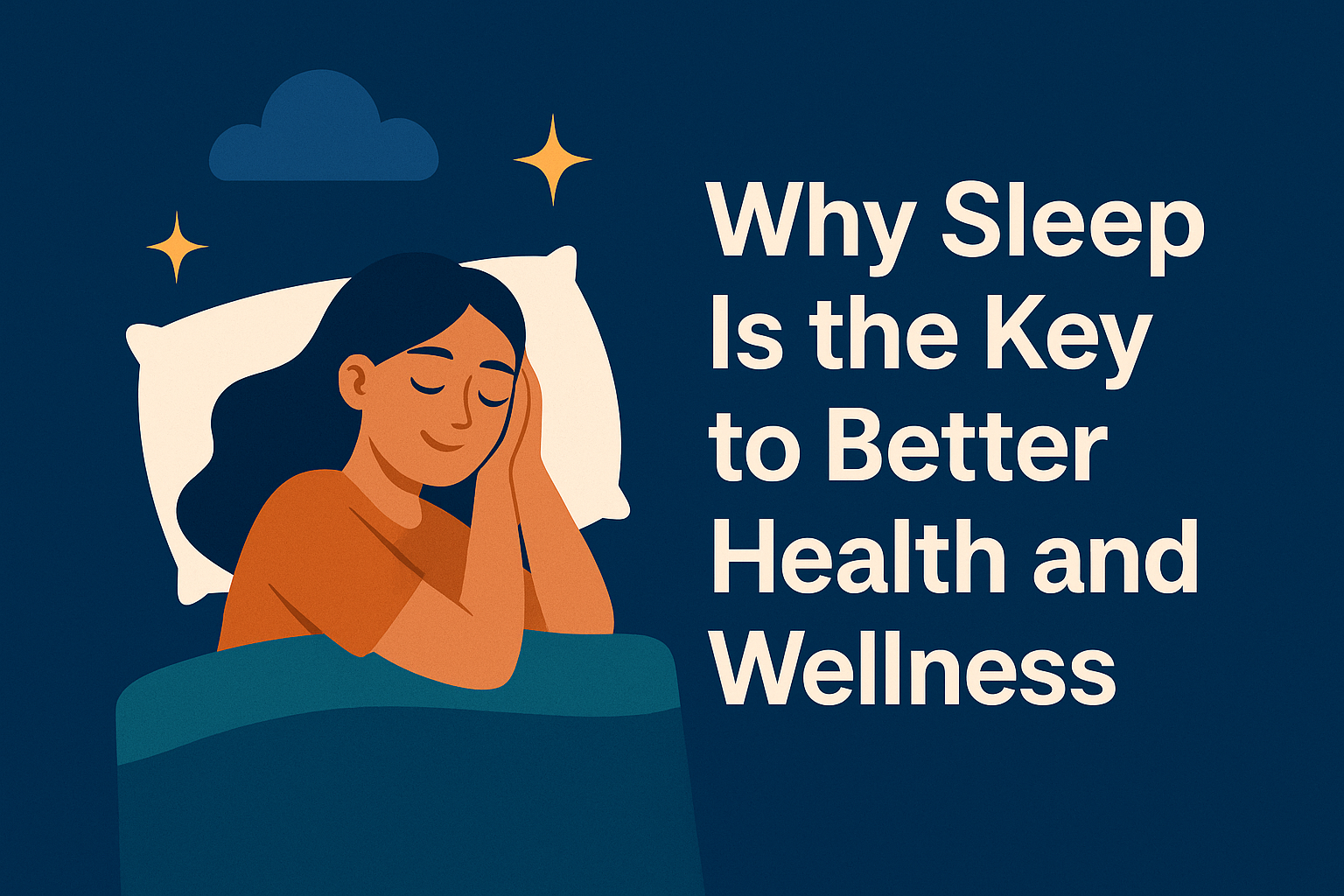
Why Sleep Is the Key to Better Health and Wellness
In the pursuit of better health, health is very much looked at through diet, exercise, and mindfulness. One of the most important components to overall wellness is sleep. Sleep is not a luxury—it is a biological necessity in virtually every physical, emotional, and mental body of yours. Let’s look at why sleep is so important, what science has to say about it, and how diet and natural remedies can help you sleep better.
 The Science Behind Sleep and Wellness
The Science Behind Sleep and Wellness
Sleep is more than just rest—it’s a period of intense biological activity that supports:
- Brain Function and Mental Health
- During sleep, the brain clears out toxins, consolidates memories, and supports learning.
- According to a study published in Nature Reviews Neuroscience (2017), poor sleep impairs attention, decision-making, and emotional regulation.
- Sleep deprivation has been directly linked to an increased risk of depression, anxiety, and even suicidal ideation.
- Immune System Regulation
- Sleep enhances immune defense. T cells ( white blood cells that fight infections ) function better when sleep is on, according to a study in the Journal of Experimental Medicine (2019 ).
- Chronic sleep deprivation suppresses immune responses, making you more susceptible to illnesses.
- Hormonal Balance and Weight Control
- Lack of sleep affects hormones like ghrelin (hunger hormone) and leptin (fullness hormone), often leading to increased appetite and cravings for unhealthy food.
- A study in The American Journal of Clinical Nutrition (2010) showed that sleep-deprived individuals consumed 300+ extra calories per day.
- Heart Health
- Short sleep is also linked with high blood pressure, heart attack and stroke.
- The European Heart Journal (2011) found a 4% higher risk of stroke in people who sleep less than 6 hours a night and a higher risk of developing or dying from heart disease.
 Recommended Sleep Duration
Recommended Sleep Duration
According to the National Sleep Foundation:
- Adults (18–64 years): 7–9 hours per night
- Older Adults (65+): 7–8 hours
- Teenagers: 8–10 hours
But quality matters just as much as quantity. Disturbed or sleepy sleep does not give you the same health benefits as deep, uninterrupted rest.
 Dietary Tips to Support Better Sleep
Dietary Tips to Support Better Sleep
Your diet can significantly affect your sleep habits. Here’s is how to eat to sleep better:
 Foods That Promote Sleep:
Foods That Promote Sleep:
- Tryptophan-rich foods – turkey, eggs, cheese, and tofu contain this amino acid that helps produce serotonin and melatonin.
- Magnesium-rich foods – almonds, spinach, avocados, and bananas help relax muscles and nerves.
- Complex carbohydrates – brown rice, oats, and quinoa can cause insulin to be released, which helps tryptophan reach the brain.
- Cherries and kiwis – high in melatonin and antioxidants, these fruits may help improve sleep onset and duration.
 Foods to Avoid Before Bed:
Foods to Avoid Before Bed:
- Caffeine (coffee, chocolate, cola): stimulant effects last up to 6 hours.
- Alcohol: it may help you fall asleep, but it also disrupts REM sleep and causes early waking.
- ” Having foods that are spicy and greasy can cause digestive upset and this can make sleeping more difficult.
 Natural Remedies and Sleep Hygiene Tips
Natural Remedies and Sleep Hygiene Tips
Natural approaches to better sleep are safe and effective remedies that are easy to follow. Here are some of the best habits:
- Establish a Consistent Sleep Routine
- Go to bed and wake up at the same time every day, even on weekends. It sets up your circadian rhythm.
- Limit Blue Light Exposure at Night
- The light emitted by devices like smart phones and laptops suppresses melatonin.. Turn them off 1 hour before bedtime.
- Create a Restful Sleep Environment
- . Keep your bedroom dark, quiet and cool
- Use blackout curtains, white noise machines, or earplugs as needed.
- Use Calming Herbal Remedies
- Chamomile tea: contains apigenin, a compound that promotes sleepiness..
- Valerian root: has sedative properties that can reduce sleep latency.
- Lavender oil: aromatherapy (using lavender ) has been shown to help improve sleep..
- Mindfulness and Relaxation Techniques
- Deep breathing, progressive muscle relaxation calms the nervous system.
- Meditation and guided imagery help to clear the brain of anxiety-related thoughts.
 Final Thoughts: Sleep as a Superpower
Final Thoughts: Sleep as a Superpower
Sleep isn’t just rest—it’s repair, renewal, and regeneration. When you get enough quality sleep, your brain functions better, your immune system strengthens, your mood stabilizes, and your body heals itself. In a busy world, sleep is essentially a weapon of well-being and happiness.
So tonight, don’t feel guilty for getting to bed early—your future self will thank you.
Sources:
- National Sleep Foundation
- Nature Reviews Neuroscience (2017)
- Journal of Experimental Medicine (2019)
- American Journal of Clinical Nutrition (2010)
- European Heart Journal (2011)
- Journal of Clinical Sleep Medicine (2016)
